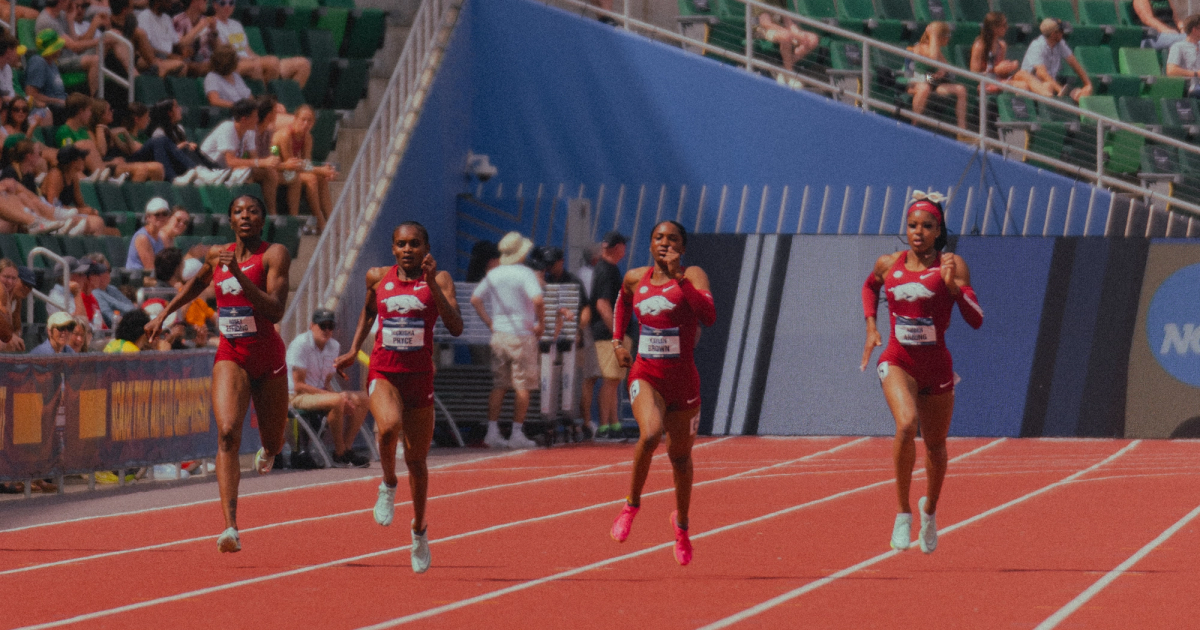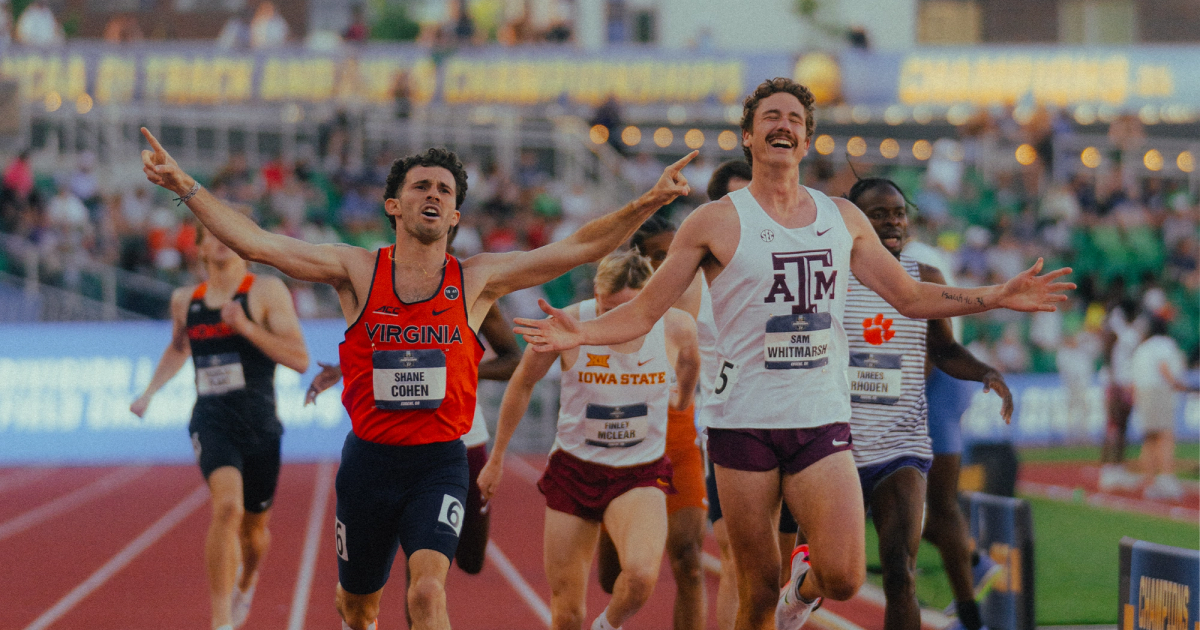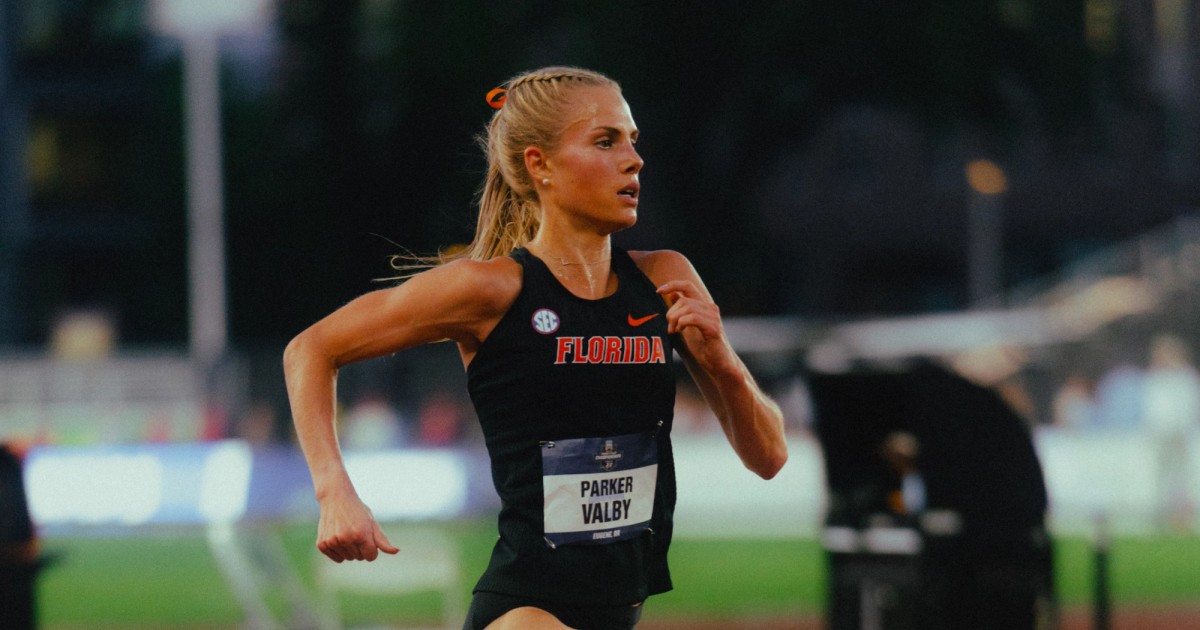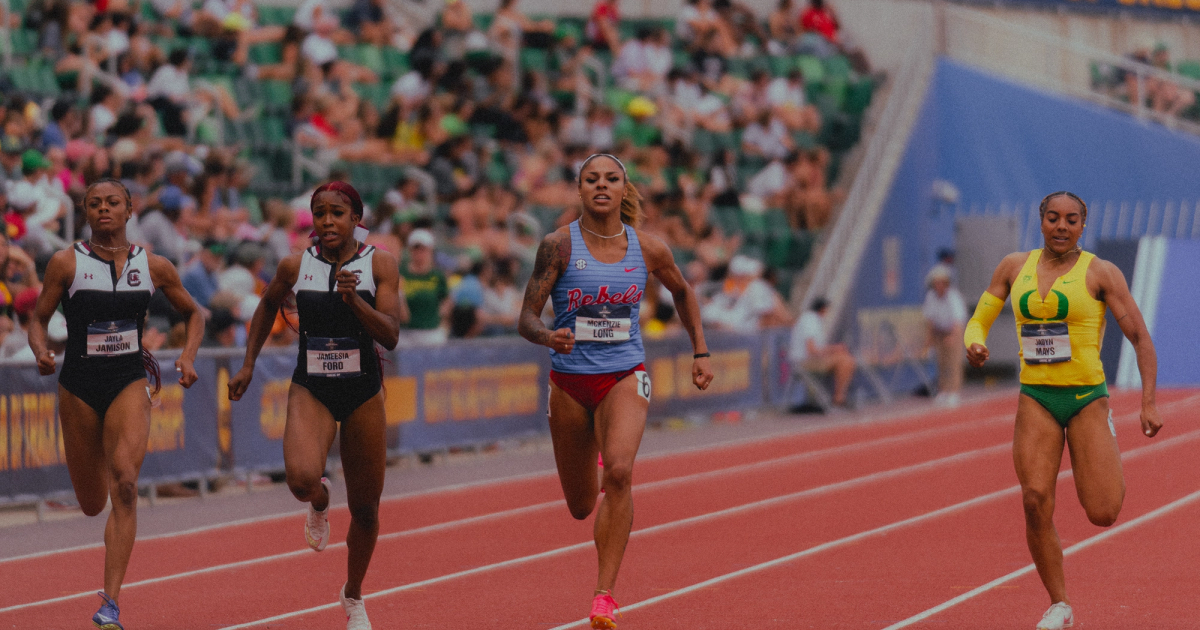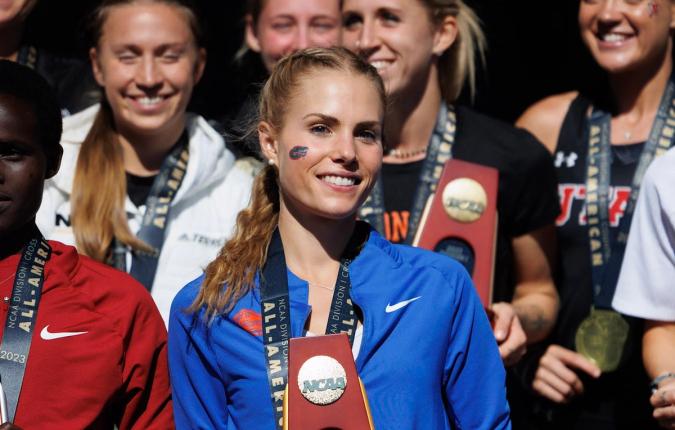By Paul Hof-Mahoney
June 12, 2024
Hayward Magic was in full effect this past week in Eugene at the NCAA Championships. En route to the Florida men (fun fact – Florida’s winning score of 41 points was the lowest by a winning men’s team since 1970, when there was a three-way tie and a much smaller program) and Arkansas women winning their respective team titles, six new collegiate records were set and nine of the 42 events contested saw new meet record established.
Today we’re going to break down the ten best performances from the four days of stellar competition. Obviously, ten performances is not quite enough to fully capture what made this meet so great, so check out the results here and I dare you to keep your jaw from hitting the floor.
Arkansas 400m squad makes history in several ways
There were two performances this week that left everyone in the media mixed zone speechless, and both came from the Razorback quarter-milers.
After a 1-2-3 finish at SECs by Nickisha Pryce, Kaylyn Brown and Amber Anning, the track world was on notice that something special was brewing in Fayetteville. This feeling continued to escalate at West regionals, where those three plus teammate Rosey Effiong cruised to a 1-2-3-4 finish and went on to break Kentucky’s 4x400m record by .01 seconds. While we certainly did take notice of these signs, nothing could have possibly prepared us for what they were able to do last week in Oregon.
The quartet swept the top four places in Thursday’s prelims, with Brown and Pryce being the only two to dip under 50 seconds at 49.82 and 49.87, respectively. Then the finals happened.
Nickisha Pryce, 48.89. Collegiate record, Jamaican record, world lead (for 20 hours before Sydney McLaughlin-Levrone ran 48.75 in New York), first collegian and first Jamaican to break 49 seconds, T-13th-fastest performer in history.
Kaylyn Brown, 49.13. Equals Britton Wilson’s collegiate record from last year, fastest 19-year-old ever, T-fifth-fastest American in history.
Amber Anning, 49.59. The fastest bronze medal-winning time in NCAA history (previously set by Pryce last year at 50.23), surprisingly not even her PB.
Rosey Effiong, 49.72. First time under 50 seconds, eighth-fastest performer in collegiate history, faster than the fourth-place times at each of the last two World Championships.
This was the first time in 103 years of NCAA Outdoor Championships that four athletes from the same team finished 1-2-3-4 in a single event. Four of the eight fastest female 400m runners in the history of the NCAA were all Arkansas Razorbacks this year. I feel like those stats really paint a great picture of the unequivocal, unprecedented dominance out of coach Chris Johnson’s crew. Oh, and that’s just the open 400m.
In the 4x400m, with the team title on the line, they proceeded to break their own two-week-old NCAA record to the surprise of absolutely nobody. What was surprising was the margin by which they broke it: 3.96 seconds. Their clocking of 3:17.96 is the tenth-fastest time in world history. It won’t go into the international record books because they represent three different countries, but it’s a historically great time nonetheless. The only squads to have gone faster were six U.S. World Championship or Olympic teams and a trio of Eastern European quartets from the ‘80s.
Brown, the only underclassman on the team, was tasked with running the anchor and she delivered to the highest level, splitting 49.05 seconds.
One last interesting thing to note - Penn’s Bella Whittaker, who finished fifth in the open 400m with a PB of 50.17, is headed to Fayetteville as grad transfer this fall. The rich get richer.
Valby caps off all-time collegiate career with another double
Florida’s Parker Valby has officially closed her career as a Gator, and what a career it was. In the span of 366 days, Valby won six NCAA titles and set collegiate records in both the indoor and outdoor 5000m as well as the 10,000m (she’s only the third-fastest ever in the indoor 3000m). In the 2023-24 academic year, she took the cross country title, completed the 3000m-5000m double at NCAA Indoors in March, and this week she dominated incredibly talented fields to win the first women’s 5000m-10,000m double at NCAA Outdoors since Dominique Scott in 2016. In doing so, she became the first woman in history to claim five distance titles in one year.
She came into both races as the heavy favorite, but Alabama’s Hilda Olemomoi was sure to give Valby some stiff competition. With runner-up finishes in both events, Olemomoi had a phenomenal championship meet, but in both races she was really just Valby’s competition up to the point where Valby decided she didn’t want to keep it close anymore.
The 10,000m was a three-woman affair at the halfway point, with Oklahoma State’s Taylor Roe joining the SEC duo in the lead pack. Roe fell off pace with 2000m left (but still finished with a 45-second PB), and Valby eventually dropped Olemomoi with a 3:36.74 final 1200m to finish in 31:46.09. Both Valby and Olemomoi were comfortably under the 32-minute barrier and therefore under Sharon Lokedi’s six-year-old meet record of 32:09.20. The new PB moved Olemomoi up to eighth on the all-time collegiate list, but Valby’s time was astoundingly almost a minute back of her collegiate record performance from April. I guess running the seventh-fastest time in NCAA history two days before you have to run another 12.5 laps and winning a national title in only your third race at the distance is cool too, though.
In the 5000m, Valby took off with just under a mile left. Her preantepenultimate lap (fourth-to-last, from 3400m to 3800m) was exactly 4.5 seconds faster than Olemomoi’s and helped to create a gap that reached a hair under 18 seconds by the time they crossed the line. Valby’s winning time was 14:52.18, the fastest time in collegiate history outdoors, shaving nearly 11 seconds off Katelyn Tuohy’s record from last spring. It was also .61 seconds quicker than her indoor record from Boston in March, making it the absolute fastest time in NCAA history. Collegiate women have broken 15 minutes in the 5000m three times, and every single one of those instances has belonged to Parker Valby in the last three months and change.
Just like her indoor championship race at 5000m, Valby came agonizingly close to securing the Olympic standard. This time, she was .18 seconds away from the 14:52-flat barrier. She said post-race that the standard wasn’t on her mind heading into this final, mentioning that if that was her goal she wouldn’t have hung with the pack during a somewhat pedestrian 74-second first lap. Along with the intrinsic messiness of Olympic distance qualification, Valby and coach Will Palmer are still unsure (at least that’s what they’ve told the media) about which event she’ll be contesting at the Trials in two weeks. The path to qualify for either event is going to be tough, but Valby could find her way to France this summer if she can finish top three in a fast race.
Hamilton and Ikeji go head-to-head in legendary hammer competition
The men’s hammer competition was the very first final of the whole meet, and saying it set the tone would be a massive understatement. The field was headlined by the trio of reigning champ Kenny Ikeji of Harvard, national leader Rowan Hamilton of Cal, and Trey Knight of CSU-Northridge. These three men all rank within the 10 best performers in collegiate history, with Ikeji’s winning mark from this meet last year pacing the field at 77.92m.
However, Ikeji’s outdoor season hadn’t been quite up to his standards, especially after winning the weight throw title indoors and moving to sixth on the all-time collegiate list in that event. He entered the meet ranked only sixth in the country and nearly fouled out of the regional meet. Hamilton and Knight were the ones that had been dominating this season, with three marks over 75m and a season’s best of 77.16m for Hamilton and four marks over 75m and a season’s best of 76.99m for Knight.
This showdown was the definition of a slugfest, with the top contenders just throwing one haymaker after another. Knight opened with a mark of 74.00m to lead after round one. Ikeji answered in round two with a big season’s best of 75.05m. That stood as the best mark for exactly three throws, when Hamilton unleashed a 76.00m throw to move into the lead. How did the champ respond? With the second-best throw of his career at 77.12m to leapfrog Hamilton. Just like the previous round, though, Hamilton had a counter. His third-round mark of 77.18m established a new PB and would end up being the winning mark. This duel signified the first time in collegiate history multiple men have thrown at least 77 meters in the same competition. It took 75.50m to finish in the top three and 71.42m to score.
For Hamilton, the title capped off a picture-perfect first and only year in Berkeley. Born in Canada, Hamilton spent the first five years of his collegiate career at British Columbia, where he won three NAIA titles and holds the 27 best marks in NAIA history. This past summer, Hamilton followed in the footsteps of fellow British Columbian hammer thrower, Camryn Rogers, and headed to California to work with coach Mo Saatara. Safe to say that decision paid off.
For the second year in a row, Ikeji displayed an uncanny ability to absolutely bring it when the lights are brightest. Last year, his season’s best (and PB) coming in sat at 74.12m before his 77.92m round six bomb. This year his best coming in was slightly higher and his mark in the competition was a little lower, but it’s still a wildly impressive example of a peak. Once this meet is factored in, Ikeji will sit in the high-40s according to World Rankings and about a meter below the standard. Unless he hits the standard, which is seemingly within his capability if he can connect everything for just one throw, he’ll most likely need to perform this well at the British Championships on June 29th and one more meet before that.
I’d like to close this section out by just expressing some of my disdain for the World Rankings system. I’m not the first and definitely won’t be the last to complain about this, but there have been examples time and time again of how this system disproportionately hurts the chances of qualifying for athletes based in the Americas, especially NCAA athletes. Now I don’t necessarily want to pick on anyone for something that’s out of their control, but I’m going to use Chilean hammer thrower Gabriel Kehr as an example. Kehr, who currently sits 11th in the World Rankings, threw 73.65m at the Gyulai Istvan Memorial last July (a GW level meet) and finished fifth. For this he was rewarded with 1234 ranking points. For his runner-up finish on Wednesday (a B-level meet), Ikeji will score 1238 ranking points. The fact that these two performances are scored as more-or-less identical despite there being a 3.5m difference in distance and Ikeji finished three places higher, all because of the predetermined category of the meet, is ridiculous to me.
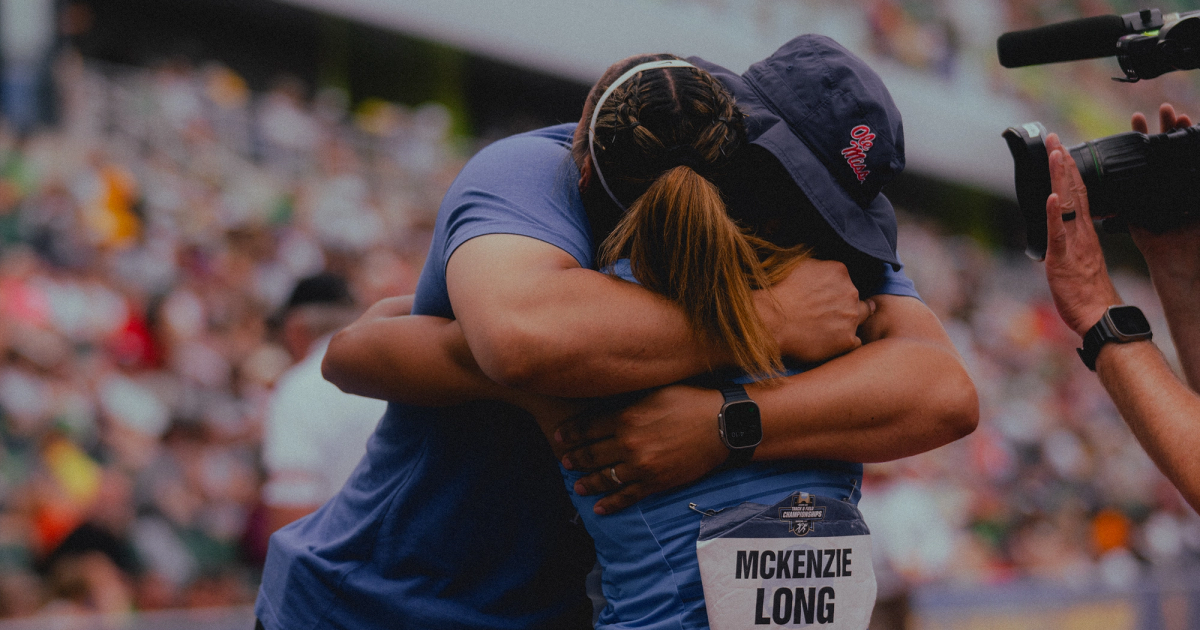
Elijah Agurs/@eavzls
Long completes emotional triple in historically fast fashion
McKenzie Long’s story throughout this season is an example of everything that makes track and field the best sport in the world. For those of you that aren’t yet aware, Long’s mother passed away this winter. She’s been incredibly open about how hard the last couple months have been for her, and she has shown astounding emotional and mental strength throughout both the indoor and outdoor seasons. And now, she has capped off her career at Ole Miss with a two-day performance that has rarely been surpassed in not just collegiate, but world history.
Long entered last week’s meet as the world leader over 200m and was a pretty clear favorite in that event. In the 100m, despite running a PB of 10.92 in the second round at the East regionals, the race to the top of the podium felt much more wide open with strong contenders like LSU’s Brianna Lyston, Oregon’s Jadyn Mays, and Texas Tech’s Rosemary Chukwuma, who posted the fastest time at regionals with a clocking of 10.88. As for the 4x100m, Ole Miss entered Hayward as the third-fastest team in the country. The odds of pulling off the triple seemed to be a bit against Long, especially given the nature of racing six times in just three days. However, after the prelims on Thursday, it almost seemed a certainty that she would have three national titles on her mantle by week’s end.
It started with the 4x100m, where Long and her teammates Akilah Lewis, Gabrielle Matthews, and Jahniya Bowers ran a new school record of 42.22. This was the fastest time in the country this year and made Ole Miss the fifth-fastest program in collegiate history. So Long was the favorite headed into the final. In the 100m, she ran another PB of 10.91, moving her into the top 10 performers in collegiate history. It was the fastest time in the prelims by a pretty significant margin in the heat with the least wind, and she looked relatively relaxed while doing it. So Long was the favorite headed into the final. Finally, in her signature event, she became the first woman in the world to dip under 22 seconds this year, running an unfairly easy 21.95. So Long was the favorite headed into the final.
With all the eyes of the track world upon her headed into Saturday’s finals, Long once again stepped up to the plate and delivered. 42.34 for the 4x100m crown. It was slower than Ole Miss’s time in the prelims, but only they had gone faster than that all year. A wind-aided 10.82 for the 100m title. Long would go on to say that while coming to the line for this final, her blocks were already perfectly set for her. Seeing this as a sign that her mom was looking down on her, it quieted her nerves before the event she felt the least comfortable in. It was a Lyles-esque race for Long in the final, but she once again showed unparalleled top speed to pull away from the field in the final 40m. Then, in the 200m, Long ran the second-fastest time in collegiate history at 21.83 to take the win by exactly a quarter-second. This was another masterful back half of the race from the now-three-time NCAA champion, as Mays and South Carolina freshman sensation Jameesia Ford were more-or-less even through the turn, but it was game over once Long turned on the afterburners.
With her collegiate career wrapped up and her name etched in the record books, Long directs her attention to the upcoming Olympic Trials where she has a legitimate chance to make the team in both the 100m and the 200m. Another thing to keep an eye on for Long is Abby Steiner’s all dates collegiate record over the half-lap distance of 21.77, which she set at U.S. Championships in 2022.
One final side note on Jameesia Ford – Long’s dominance over the outdoor 200m may have taken some attention away from Ford after an all-time great indoor season, but her outdoor season was still ridiculous. Her runner-up finish in the finals came at 22.08 seconds. That made her the seventh-fastest woman in NCAA history, broke Allyson Felix’s American U20 record (which Ford had equalled at SECs), and cemented her spot as the second-fastest woman in U20 history, behind only Christine Mboma. Ford currently sits tied for third in the U.S. this year in the 200m, and one of the three women equal to or ahead of her is Sydney McLaughlin-Levrone. Obviously there are a ton of professional athletes that we expect to be faster at Trials than what we’ve seen from them to this point in 2024 (*cough* Sha’Carri Richardson is currently ranked 108th in the world *cough*), but it’s not out of the realm of possibility that two collegians will be wearing the red, white, and blue in Paris.
Stevenson’s late-round heroics capture long jump title
As we touched on in our preview for this meet, the men’s long jump competition was wide open. With so many strong competitors, USC sophomore JC Stevenson was certainly a contender headed into this meet, but far from a favorite. That idea seemed to be holding true through five rounds of the competition, when Stevenson sat in seventh with a best mark of 7.85m. Sitting at the top of the standings, separated by only 4cm, were FSU’s Jeremiah Davis at 8.07m, Florida’s Malcolm Clemons at 8.05m, and Stevenson’s teammate Johnny Brackins at 8.03m.
In the sixth round, on the final jump of his collegiate season, Stevenson leapt out to 8.22m, a new PB and the best mark in the nation this year. None of the six men ahead of him were able to improve their mark in the final round, which made Stevenson USC’s first champion in the event since 1977.
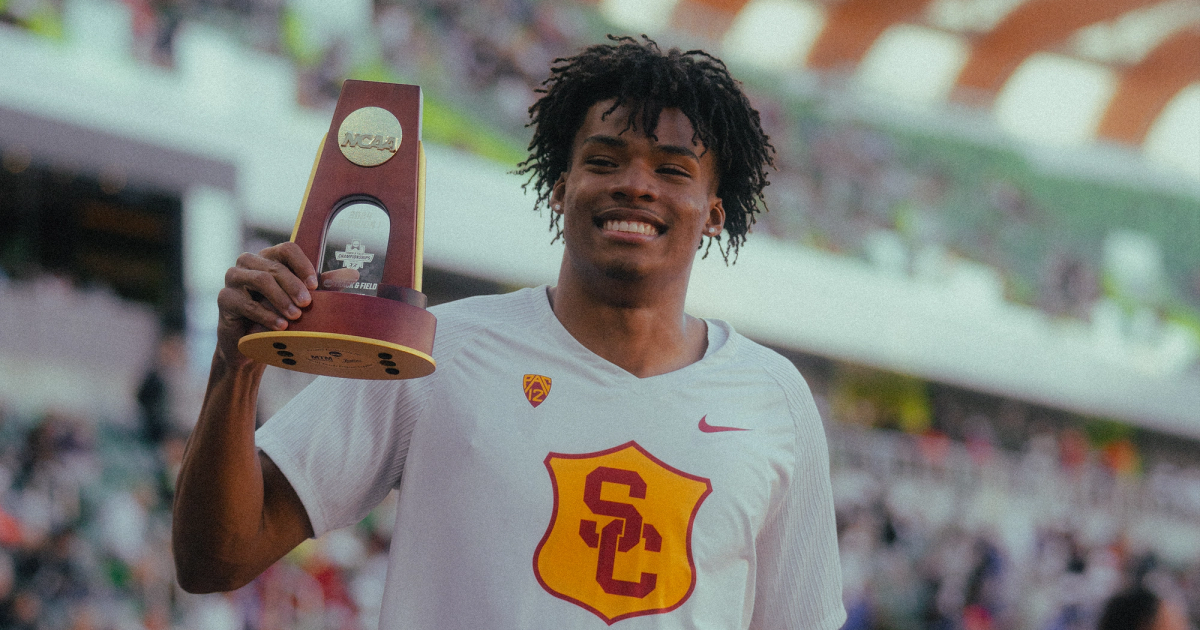
Elijah Agurs/@eavzls
Stevenson’s 8.22m places him at the top of the U.S. rankings outdoors this year. At only 20 years old, he could become the youngest man to represent Team U.S.A. at the Olympics in this event since Larry Myricks in 1976. Brackins sits second on that list, so it’s not entirely out of the realm of possibility that we see two long jumpers from USC head to Paris.
The most shocking result from this final was indoor champ Wayne Pinnock of Arkansas placing fifth in the last collegiate meet of his career. His final mark was 7.98m, his first time failing to clear 8 meters in a competition since the 2022 World Championships. He disclosed after the meet that he has been dealing with “some setbacks” in his training and is looking ahead to the Jamaican Championships at the end of the month. Fresh off signing a professional contract with Puma, let’s hope Pinnock can get right before Paris, because the Olympics will be better with him there.
Five in a row for the Huskies with Waskom’s win
Joe Waskom, Luke Houser, Nathan Green, Luke Houser, Joe Waskom: the winners of each of the last five 1500m/mile NCAA titles. In doing so, the Washington Huskies have become the first team since Villanova from 1979-81 to claim three consecutive outdoor 1500m titles and the first team ever to claim five straight titles across the 1500m and mile distances.
The tactical dominance of coach Andy Powell’s athletes was on full display again this weekend as Waskom moved from seventh to first over the final 200m of a race where the top 10 finishers were within a second-and-a-half of each other.
The last 100m of this race was about as entertaining as track and field can possibly get. NAU’s Colin Sahlman held the lead coming out of the turn and looked to be in solid form. Then, Oregon’s Elliott Cook found another gear and made a move to pass Sahlman on the inside, using the fuel from the home crowd to power down the home straight. It then looked like Australian champion Adam Spencer of Wisconsin might have the strength to overtake both Cook and Sahlman for a moment. And finally, Waskom came from the back of the picture to take the win all the way out in lane three. That is exactly the kind of race you’d want to see in a championship final.
Looking ahead to the Trials, Waskom is only the 51st-fastest American this year with his season’s best from the prelims sitting at 3:37.93. But the situation isn’t too far off from where he was this time last year, and he finished second at the U.S. Championships last year behind only Yared Nuguse to punch his ticket to Budapest. The field is going to be stuffed to the gills with talent and it’ll be a tall ask of any collegian to even make the final, but if there’s one thing you should’ve learned in the last three years it’s that you don’t count out the Huskies in a championship race.

Neugebauer rewrites record books once again
Leo Neugebauer is a freak of nature. This week, the towering Texas Longhorn demolished his own collegiate decathlon record with a new mark of 8961, the sixth-best in world history. In the process, he set a new decathlon best in the discus at 57.70m, the first time any decathlete has recorded a 1000 point discus throw. Isn’t it crazy that the guy who can throw 58m in the discus with regularity and nearly 17.46m in the shot put can also high jump 2.07m, long jump 8m, and pole vault 5.21? That’s not crazy, it’s Leo Neugebauer.
Neugebauer won this competition by 830 points. He could have walked the 1500m and still won the NCAA title by 170 points. That is how vast the gap between Neugebauer and the rest of the country is. Oh, and just for fun he picked up a third-team All-American honor in the open discus as well.
The frightening thing is that I feel we are far from seeing Neugebauer at the peak of his powers. Now, that seems like a pretty obvious thing to say about someone who turns 24 next week. But I wouldn’t be surprised at all to see him PB again and crack the 9000 point barrier in Paris come August. To make up that 39 point gap, some of those points could be picked up simply with some favorable winds. Neugebauer’s 100m in Eugene was run with 0.0m/s win and his 110mH race was run with +0.1m/s. The elevated level of competition and the sense of having more at stake, especially in the 1500m, could help push Neugebauer into this new territory as well.
However, I think the biggest area to improve for the German is easily in his javelin throw. Of the 25 highest-scoring men in history, only Neugebauer threw the discus farther than he threw the javelin during his PB performance, and a significant majority of these men have javelin marks 12-15m better. His PB in javelin is slightly ahead of the best discus throw of his life, but it just doesn’t make sense seeing someone who is such a strong thrower seemingly miss out on so many points. In spite of this, he should be the favorite moving into the Olympics. He holds the world lead by a wide margin and his mark would’ve won this week’s European Championships by 197 points.
Cohen kicks for the win in storybook season
On May 13, 2023, Shane Cohen ended his season at D2 University of Tampa by running 1:54.33 and finishing in 29th place at the Lee University Last Chance Meet. On June 7, 2024, Shane Cohen ended his season at Virginia by running 1:44.97 to become the DI 800m national champion, outkicking the seventh-fastest athlete in NCAA history in the process.
His indoor season showed absolutely no signs of this kind of breakout. He ran a PB of 1:48.15 and was bounced in the heats at the ACC Championships. Moving outdoors, he began to chip time away with each race, but by the time he broke 1:47 for the first time to finish third at ACC Outdoors, it was still tough to even call him a contender in the national picture.
Things then shifted dramatically for Cohen in the second round at East regionals, where he deployed what would become his signature devastating kick in the final 100m, going from last to second and punching his ticket to nationals with a PB of 1:45.36. This was where he began to catch some people’s attention, but most of the fans following along still probably didn’t know who he was headed into Eugene.
In the prelims, it was more of the same. Cohen sat in eighth on the final turn, yet still found a way to swing wide and finish first in 1:46.94. But now it’s the finals. Now he has to take on Texas A&M’s Sam Whitmarsh. Surely he won’t be able to pull it off again! Wrong.
This final was awesome. Tarees Rhoden of Clemson took it out hard in 51.28, but Cohen and Whitmarsh stayed patient, sitting in eighth and fifth at the bell, respectively. As the race got to just past the steeplechase pit on the final bend, that’s where chaos began to ensue. Whitmarsh, still in fifth, looked to move outside but found himself boxed in and eventually fell to sixth entering the home straight. Cohen, meanwhile, had begun his kick and was running out in lane three, needing to dodge the falling Camden Marshall of Indiana.
Somehow, in the final 100m, Whitmarsh found a path through the mass of runners ahead of him and it looked like he was going to find a way to pull off the title. But then, even though he had to take a few strides all the way out in lane four, Cohen came through in shades of Robby Andrews to complete his Cinderella senior season.
One year ago, Shane Cohen was a complete unknown to even the most hardcore distance fans. Now he’s a national champion, one of the 25 fastest men in collegiate history, and stands a legitimate chance to become an Olympian in two weeks. Isn’t this sport just the best?
Hurdlers show out in every event
There was one event group this week where every single athlete that became NCAA champion did so with a PB and, in doing so, entered or solidified their place in the ranks of the 10 best performers in collegiate history: the hurdles.
Let’s start with the women’s 100mH, where Grace Stark of Florida capped off an unfairly consistent season with a new PB of 12.47 to clinch the first outdoor title of her career. The win was a perfect ending to what has been a tough two years for Stark. In 2022, Stark was coming off a win in the 60mH at NCAA Indoors and held the collegiate lead outdoors heading to SEC Championships, where she unfortunately broke her leg. 2023 was a solid season where Stark finished fifth at NCAA Outdoors, but her road to recovery still seemed to be holding her back from the full potential she had shown the year before.
This indoor season, Stark finished second at nationals and has since been on an absolute tear outdoors. She has gone completely undefeated over the 100mH this year and her slowest time in a non-qualifying race this season was 12.70, which was a world lead when she ran it in March. And Saturday, back on the track where she should have been running at this same meet two years ago, she becomes the ninth-fastest woman in NCAA history and took the win in a very fast final, with Washington State’s Maribel Caicedo (12.56) and UCF’s Raniyah Jones (12.59) both running under 12.6 seconds.
The men’s 110mH had a very clear favorite coming into the meet in Auburn’s Ja’Kobe Tharp. Tharp, who is the second-fastest junior hurdler in world history, has been lighting the track up since the postseason started, running times of 13.44, 13.24 twice, and 13.18 twice in his five most recent races headed into Friday’s final. It seemed like a safe bet Tharp would go even faster in the finals given his consistency.
That ended up not being the case, however, as Tharp ran 13.20 in the final and finished second behind a massive PB from Nebraska senior Darius Luff. This was the seventh NCAA Championships indoors or out for the Lincoln native, and his previous highest finish was a bronze in the 60mH last year. Luff had run 13.25 in May to become the Big 10 champion, but dropping that PB down to 13.19 was still a significant improvement, moving him up to a tie for ninth on the all-time collegiate list. Tharp and Luff now sit sixth and seventh on the U.S. list for 2024, and there’s a strong likelihood we see them do battle again alongside some of the biggest names in the sport at the Olympic Trials.
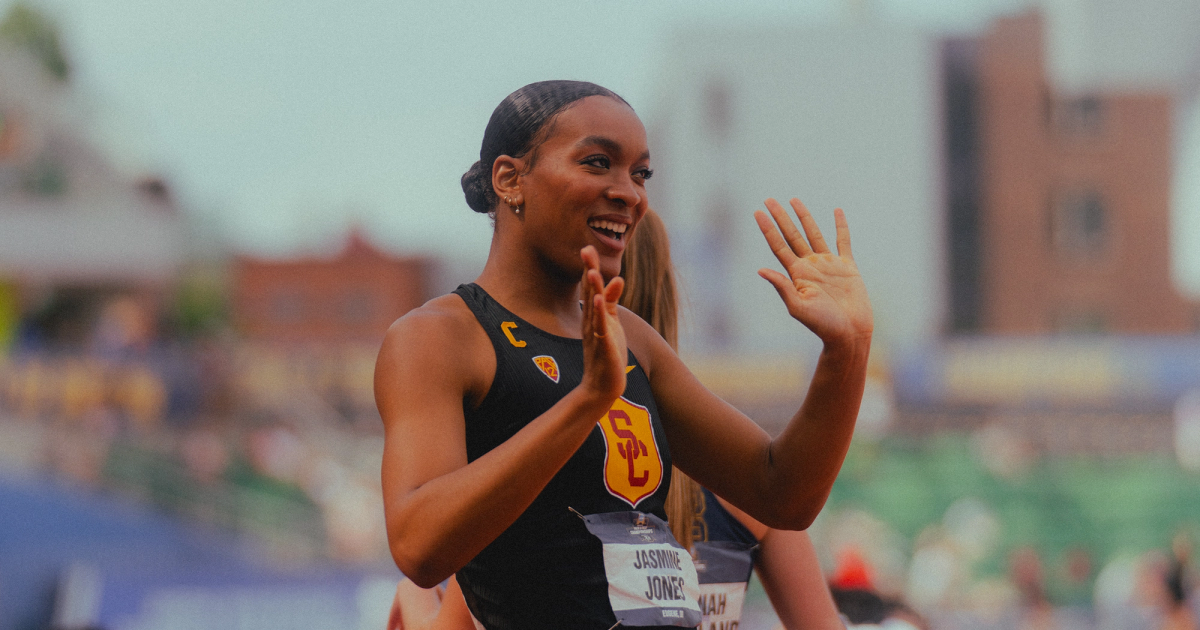
Elijah Agurs/@eavzls
Jasmine Jones of USC is insanely good at hurdling. This indoor season, she won the NCAA title in the 60mH in 7.77 seconds three weeks after finishing runner-up at the U.S. Championships. Her outdoor season got off to a rough start, hitting a hurdle and ending up as a DNF in her 100mH opener at Florida Relays, but she’s seen steady, marked improvement across both hurdles races throughout the season. She ran 53.87 to become the Pac-12 champion in the 400mH, which then placed her as the seventh-fastest collegian in history, and she ran a wind-aided 100mH time of 12.58 at West regionals.
When it came time for the finals of the big dance, Jones first took fourth in the high hurdles in a new PB of 12.64, and later dropped a mind-boggling 53.15 in the 400mH to become the NCAA champion. On the collegiate all-time list, that mark is only bested by Sydney McLaughlin-Levrone, and only McLaughlin-Levrone and Femke Bol have run faster in 2024. The craziest part is that Jones was only in third coming through the eighth hurdle, behind Savannah Sutherland of Michigan and Rachel Glenn of Arkansas. But she showed a level of strength over the final 100m that we really only see from the absolute best hurdlers in history. After this performance, she should be a favorite to finish inside the top three at Trials and send herself to Paris.
Sutherland deserves a huge shoutout as well, as she dropped her PB by well over a second across two rounds of racing in Eugene, securing the Canadian record in the process. If she can keep this form up, she could have a solid claim for the up-for-grabs bronze at the Olympics.
The men’s 400mH in Eugene was supposed to be wild and did it ever live up to the hype. Coming into the meet, there were four men who all had a legitimate chance at the gold. Alabama’s Chris Robinson was the slight favorite, as he was coming in with the national title from 2023 and as the only man to break the 48-second barrier. The Big 12 duo of Baylor’s Nathaniel Ezekiel and Texas Tech’s Caleb Dean provided strong challenges with respective PBs of 48.00 and 48.05, but Robinson’s toughest competition headed into the final looked to be Clement Ducos of Tennessee. Ducos was the only man in the country to beat Robinson so far in 2024, winning their shared prelim on Wednesday. Ducos also crossed the finish line first at SECs in a massive time of 47.69, but was later DQed for hooking a hurdle. Despite the fact that there were four strong contenders that all had the capability of running very fast, I don’t think anyone was quite expecting what ended up playing out in the final.
Unfortunately, Ducos pulled up after two hurdles in the final clutching his hamstring, but with how fast Dean ended up running I’m not sure the Frenchman would’ve had enough to stay with him. Dean crossed the line in 47.23 seconds, the second fastest time in collegiate history behind only Rai Benjamin. That time ties Dean as the 11th-fastest man to ever run the event and should give him an excellent chance at making the American team for Paris.
Robinson finished second in 47.98 and will have some solid momentum of his own when he heads back to Hayward in two weeks as the third-fastest man in the country this year.
Otabor drops a bomb and becomes a part of history
Finally, we’re going to cap this off with what was hands down the most surprising performance of the meet. Rhema Otabor of Nebraska won her second consecutive NCAA javelin title on Thursday night. That’s not the surprising part - she was ranked second in the nation coming and was obviously the returning champion. What was surprising, however, was the mark she won with. In the fifth round, Otabor launched her javelin 64.19m, which broke Maggie Malone-Hardin’s NCAA record by exactly two meters. Even more surprising? Before that throw, it didn’t even look like she was going to win.
Texas A&M’s Lianna Davidson opened her evening at 60.70m which was a PB by almost two meters and landed her sixth on the all-time collegiate list. Through four rounds, Davidson was still comfortably in the lead and it just seemed like Otabor didn’t have it that day, as she had four legal marks but all of them were below 57m. It would be safe to say things changed after that, though, as she went on the break not just the NCAA record, but the Bahamian record as well, in the next round.
Aside from the obvious big PBs, the meet was huge for both Otabor and Davidson’s chances to go to Paris. Otabor surpassed the Olympic standard of 64.00m so she should be ready to pack her bags, while Davidson further strengthened her third place spot on the Australian list for 2024. However, lurking behind her in fifth is two-time World Champion Kelsey-Lee Barber, and it may be hard for the Australian selectors to leave her off the Olympic team.

Paul Hof-Mahoney
Paul is currently a student at the University of Florida (Go Gators) and is incredibly excited to be making his way into the track and field scene. He loves getting the opportunity to showcase the fascinating storylines that build up year-over-year across all events (but especially the throws).
